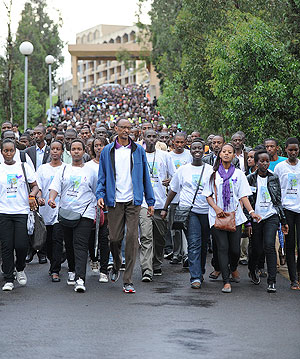On Saturday afternoon, thousands and thousands of people walked with the President to commemorate 18 years since the 1994 Genocide against the Tutsi. In 1994, the very roads we walk on today were systematically transformed into terrifying assemblage of machete wielding men, violence and murder.


On Saturday afternoon, thousands and thousands of people walked with the President to commemorate 18 years since the 1994 Genocide against the Tutsi. In 1994, the very roads we walk on today were systematically transformed into terrifying assemblage of machete wielding men, violence and murder. Every corner of the country was engulfed and when the brutal madness ended after a period of about 100 days, over one million people were dead, with thousands more injured, traumatized and displaced. In light of such massive tragedy, I expected the official commemoration to be an emotional and sombre event, but was surprised that the tone was fairly uplifted. The 30 - minute walk, which started at Parliament in Kimihurura ended at the Amahoro (Peace) Stadium, which was filled to capacity. Walk to remember, is an initiative led by the youth intended to remember those who died in the genocide and to take a stand against it ever happening again. "As young people, we should fight against anything that will lead to ethnic division among ourselves,” says Vanessa Umubyeyi Mupenzi, an 18 year old genocide survivor who spoke on behalf of the youth. Umubyeyi, who in 1994 was a month old, survived the mass killings of the Tutsis together with her mother. The survivor who is now a senior six student offering mathematics, chemistry and biology at Lycee’ Notre Dame de Citeaux, said all her other close relatives were killed during the Genocide. "We are all Rwandans so why should we turn against each other? Let’s join hands and build our country instead of destroying it,” Umubyeyi suggested. This walk and all future walks are basically of the same mission; to remember victims of the 1994 Genocide against the Tutsi and engage communities both locally and worldwide to stand against any discordant ideology that will lead to genocide. "Why must we remember?” someone may wonder. The discriminatory leadership of the government at the time is reason enough. Because of that, Rwanda is now scarred and also recorded as a country with one of the most horrific massacres in the history of the world.What happened here 18 years ago is enough to send chills down even the devil’s spine! Remembering is our only way to honour the people who were mercilessly butchered including children and babies! Remembering puts a firm hold on "never again” to genocide anywhere in the world.


